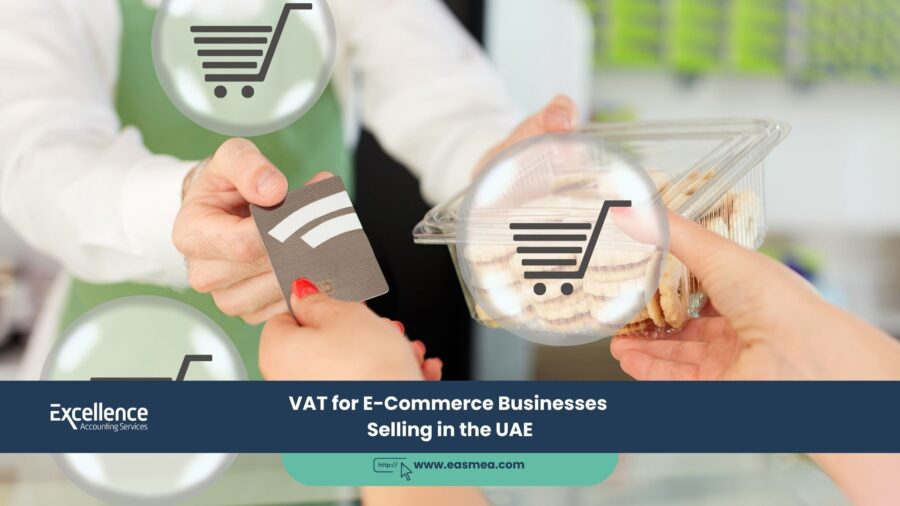A Guide to VAT for E-Commerce Businesses Selling in the UAE
The UAE’s e-commerce sector is a powerhouse of growth, offering immense opportunities for both local entrepreneurs and international brands. However, this digital marketplace operates within a structured tax framework, and understanding the nuances of Value Added Tax (VAT) is not just a matter of compliance—it’s essential for correct pricing, profitability, and avoiding costly penalties. For an online seller, the rules can be more complex than for a traditional retailer, involving questions of digital services, place of supply, and the status of the customer.
Whether you’re a UAE-based startup selling locally, an international brand selling to customers in the UAE, or a marketplace operator, the VAT implications of your transactions must be clearly understood. A failure to register for VAT when required, or to correctly charge and account for it, can lead to significant liabilities with the Federal Tax Authority (FTA).
This guide provides a comprehensive overview of the key VAT considerations for e-commerce businesses operating in or selling to the UAE. We will cover the core principles, the treatment of goods versus digital services, and the specific rules for resident and non-resident suppliers, giving you the clarity needed to navigate this digital tax landscape.
Key Takeaways
- VAT Applies to E-Commerce: Online sales of goods and services delivered within the UAE are subject to the standard 5% VAT, just like brick-and-mortar sales.
- Place of Supply is Key: The VAT treatment depends on the location of the supplier and the customer. For goods, it’s generally where the goods are delivered. For electronic services, it’s where the customer resides.
- No Threshold for Non-Resident Sellers: A non-resident business selling goods or services to non-VAT-registered customers in the UAE must register for VAT from their very first sale. The AED 375,000 threshold does not apply.
- Delivery Charges are Taxable: If you charge a fee for delivering goods, that fee is considered part of the service and is also subject to 5% VAT.
- Reverse Charge Mechanism: When a UAE VAT-registered business buys digital services from a foreign supplier, the UAE business is responsible for accounting for the VAT through the reverse charge mechanism.
The Core Principle: Place of Supply
The fundamental question in e-commerce VAT is determining the “place of supply.” This dictates whether the transaction is subject to UAE VAT. The rules differ for goods and services.
1. Supply of Goods
For physical goods sold online, the place of supply is generally where the goods are delivered.
- Goods delivered within the UAE: The sale is subject to 5% UAE VAT. This applies whether the seller is based in the UAE or overseas.
- Goods exported from the UAE to outside the UAE: This is an export and is eligible for zero-rated VAT (0%). The seller must retain official export documentation as proof.
2. Supply of Electronic/Digital Services
This includes services like software downloads, streaming subscriptions, online courses, and digital content. The place of supply is considered to be the usual place of residence of the recipient.
- Service supplied to a UAE resident: The service is subject to 5% UAE VAT, regardless of where the supplier is located.
- Service supplied to a non-UAE resident: The service is considered outside the scope of UAE VAT.
VAT Rules for Different Seller Scenarios
The specific obligations depend on whether the online seller is a resident of the UAE.
Scenario 1: UAE-Based E-commerce Business
If your e-commerce business is licensed and based in the UAE, you are a “resident supplier.”
- Registration: You must register for VAT if your taxable supplies exceed the mandatory threshold of AED 375,000 in a 12-month period.
- Sales within UAE: You must charge 5% VAT on all sales of goods and digital services to customers in the UAE.
- Sales outside UAE (Exports): You can zero-rate these sales, provided you maintain the necessary export documentation.
- Input Tax: You can recover the VAT you pay on your business expenses (e.g., inventory, marketing, web hosting) through your VAT return. This is a crucial part of effective accounting and bookkeeping.
Scenario 2: Non-Resident (Foreign) E-commerce Business
If your business is based outside the UAE but you sell to customers located within the UAE, you are a “non-resident supplier.” The rules here are very strict.
- Selling to UAE Consumers (B2C): If you sell goods or digital services to non-VAT-registered customers in the UAE, you **must register for UAE VAT immediately**. There is **no registration threshold**. You must charge 5% VAT from your first sale.
- Selling to UAE Businesses (B2B): If you sell digital services to a VAT-registered business in the UAE, you do not charge UAE VAT. Instead, the UAE business customer is responsible for accounting for the VAT under the **Reverse Charge Mechanism (RCM)**.
The Reverse Charge Mechanism shifts the responsibility for accounting for VAT from the foreign supplier to the UAE business customer. This is a critical concept for any UAE business that buys services from international companies like Google or Facebook.
Navigate E-commerce VAT with Excellence Accounting Services (EAS)
The cross-border and digital nature of e-commerce makes VAT compliance particularly complex. EAS provides specialized VAT services to ensure your online business operates smoothly and compliantly.
- Specialized VAT Consultancy for E-commerce: We provide tailored advice on place of supply rules, the reverse charge mechanism, and registration obligations for both resident and non-resident online sellers.
- VAT Registration Services: We manage the VAT registration process for both local and foreign e-commerce businesses, ensuring you are compliant from day one.
- E-commerce VAT Return Filing: We handle your periodic VAT returns, ensuring accurate reporting of local sales, exports, and reverse charge transactions.
- Strategic Tax Planning: As part of our CFO services, we can advise on structuring your e-commerce operations in the most tax-efficient way.
Frequently Asked Questions (FAQs)
Yes, if your taxable sales exceed the AED 375,000 mandatory registration threshold. Selling through social media is treated the same as selling through a dedicated website. You are an e-commerce business and the standard rules apply.
It depends on your business model. If you are acting as an agent and simply facilitating the sale between a buyer and a seller, the seller is responsible for the VAT. However, if your platform is considered to be making the supply to the end customer, you may be responsible. The contractual arrangement is key, and professional advice is essential.
Yes. If you charge a customer for delivery, this charge is considered part of the overall service you are providing. Therefore, you must charge 5% VAT on the delivery fee.
If your UAE VAT-registered business buys AED 1,000 of advertising from a foreign company like Google, Google will not charge you VAT. On your VAT return, you must self-assess the VAT. You will declare AED 50 as output tax (as if you charged it to yourself) and, because it’s a business expense, you will also claim the same AED 50 back as input tax. The net effect on your payment to the FTA is zero, but the transaction must be reported.
If you refund a customer for a returned item, you must also refund the VAT you charged. You should issue a tax credit note to the customer, and you can then adjust your output tax on your next VAT return to reclaim the VAT you refunded.
When you sell to a customer in the UAE, the goods are being imported. The place of supply is the UAE. The transaction is subject to 5% VAT. You will need to account for import VAT when the goods enter the country and then charge output VAT to your customer.
Yes. You must issue a valid tax invoice for every taxable supply. For sales to consumers (B2C), you can issue a simplified tax invoice. For sales to other businesses (B2B), a full tax invoice is required.
Generally, yes. If you are a Free Zone business selling goods or services to customers on the UAE mainland, those sales are subject to the standard VAT rules. The concept of a “Qualifying Free Zone Person” provides some exemptions, but these typically apply to B2B transactions within designated zones, not B2C e-commerce sales to the general public.
Fees charged by local UAE payment processors are for a financial service and are subject to 5% VAT. You can recover this VAT as an input tax. Fees from foreign processors may be subject to the reverse charge mechanism.
Your e-commerce business’s net profits will be subject to the 9% UAE Corporate Tax (on profits above AED 375,000). This makes accurate accounting for all your revenue and costs, including VAT, more important than ever to ensure your taxable income is calculated correctly.
Conclusion: Compliance is Key in the Digital Marketplace
The digital nature of e-commerce offers incredible reach and scalability, but it also brings unique tax compliance responsibilities. For online businesses selling in the UAE, a proactive and informed approach to VAT is essential. By understanding the rules of supply, your registration obligations, and the correct treatment of different transaction types, you can ensure your business operates on a compliant footing, freeing you to focus on what you do best: growing your online brand.
Is Your E-commerce Business VAT Compliant?
Partner with Excellence Accounting Services for specialized VAT advisory and compliance services tailored for the UAE e-commerce sector.




